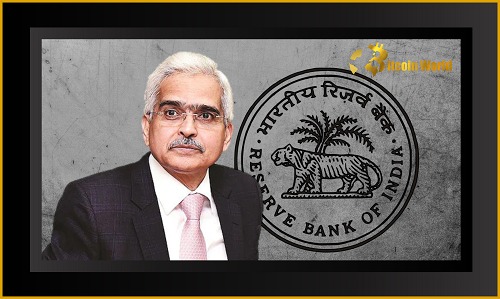The cryptocurrency world is still reeling from the dramatic collapse of Terra’s UST and LUNA. Amidst this turmoil, Reserve Bank of India (RBI) Governor Shaktikanta Das has once again voiced strong reservations about cryptocurrencies. In a recent interview, Das emphasized the central bank’s long-held warnings against crypto, suggesting that the Terra saga only validates their concerns. But what does this mean for the future of crypto in India? Let’s dive into the details.
RBI’s Stance: ‘We Told You So!’
Speaking to CNBC TV18, Governor Das didn’t mince words. He stated that even if crypto had been regulated in India prior to the Terra implosion, the effectiveness of such regulation would be questionable in light of recent events. Essentially, his message is clear: the inherent nature of cryptocurrencies makes them risky, regulation or not.
Why is the RBI So Concerned About Crypto?
Governor Das articulated several key reasons behind the RBI’s persistent apprehension towards cryptocurrencies. Let’s break down his main points:
- Lack of Underlying Value: Das argues that cryptocurrencies are based on “nothing.” This is a core concern for central banks globally, as traditional currencies are backed by the issuing authority and the economy. Cryptocurrencies, in their decentralized nature, lack this conventional backing, which raises questions about their intrinsic worth.
- Regulatory Challenges: The RBI governor highlights the significant difficulties in regulating cryptocurrencies. Their borderless and decentralized nature presents unique challenges for regulators worldwide. How do you effectively control something that exists outside traditional financial frameworks? This is a question that continues to puzzle policymakers.
- Threat to Financial Stability: Perhaps the most critical concern for the RBI is the potential of cryptocurrencies to undermine India’s monetary, financial, and macroeconomic stability. Unregulated and volatile crypto markets could pose systemic risks to the broader financial system, especially if adoption becomes widespread.
In essence, the RBI’s stance is rooted in protecting the Indian financial system and its investors from perceived risks associated with cryptocurrencies.
Government and RBI: On the Same Page?
While there’s been much debate about the Indian government’s approach to crypto, Governor Das suggests a unified front between the RBI and the government. He stated that they are “in sync” on crypto regulation, indicating that the government shares the central bank’s concerns.
“We have conveyed our position to the government and they will take a considered call,” Das concluded, suggesting that the final decision on crypto regulation rests with the government, but with significant input and alignment from the RBI.
What Does This Mean for Indian Crypto Traders and Investors?
The RBI governor’s continued skepticism, especially in the wake of the Terra collapse, paints a somewhat grim picture for the Indian crypto market. While a complete ban isn’t explicitly stated as the only option, the RBI’s strong reservations certainly lean in that direction. Here’s what Indian crypto enthusiasts should consider:
- Increased Regulatory Scrutiny: Expect tighter regulations and potentially stricter measures from the Indian government. The RBI’s stance will likely influence policy decisions, possibly leading to more stringent KYC norms, higher taxes, or limitations on crypto activities.
- Volatility and Market Sentiment: Statements like these from the RBI governor can impact market sentiment. Negative pronouncements might trigger increased volatility and potentially dampen investor enthusiasm in the Indian crypto space.
- Future of Crypto Exchanges in India: Indian crypto exchanges are already operating under a cloud of uncertainty. A more hardline stance from the government, influenced by the RBI, could further challenge their operations and future growth prospects.
Is a Crypto Ban Inevitable in India?
While the government has indicated that crypto won’t be entirely banned, the RBI’s persistent advocacy for a ban cannot be ignored. The future remains uncertain, but the following points are crucial to consider:
- Global Regulatory Trends: India is not alone in grappling with crypto regulation. Global regulatory trends and international collaborations will likely influence India’s approach.
- Technological Innovation vs. Financial Stability: The government needs to balance the potential for technological innovation that blockchain and crypto offer with the need to maintain financial stability and protect investors.
- Investor Protection: The RBI’s concerns about investor protection are valid, especially given the volatility and risks inherent in the crypto market. Any regulatory framework must prioritize safeguarding investors’ interests.
For now, Indian crypto investors and exchanges must navigate a landscape filled with uncertainty. Keeping a close watch on government announcements and RBI pronouncements will be crucial in the coming months.
Related Post – The Indian Finance Minister hails blockchain technology
In Conclusion: Navigating the Crypto Regulatory Maze in India
The RBI governor’s recent statements underscore the ongoing tension between cryptocurrency and traditional financial institutions in India. While the government’s final stance remains to be seen, the central bank’s strong reservations suggest a cautious and potentially restrictive path forward for crypto regulation in India. For Indian crypto enthusiasts, staying informed and prepared for potential regulatory changes is more important than ever. The journey of crypto in India is far from over, and the next chapter promises to be crucial in shaping its future.
Disclaimer: The information provided is not trading advice, Bitcoinworld.co.in holds no liability for any investments made based on the information provided on this page. We strongly recommend independent research and/or consultation with a qualified professional before making any investment decisions.


